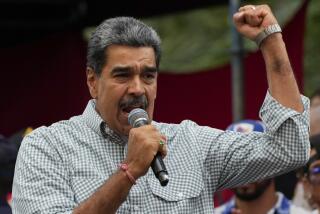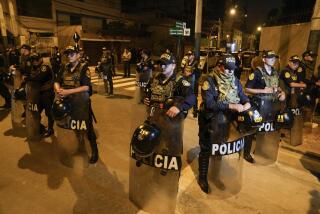Colombia recovers hostage videos
- Share via
CARACAS, VENEZUELA — Colombian authorities reported Friday they had recovered “proof of life” videos showing three U.S. hostages and a former Colombian presidential candidate who has been held by leftist guerrillas for nearly six years.
The discovery brought hope to the captives’ families but was bound to fan the flames of a bizarre and heated dispute that saw Colombian President Alvaro Uribe abruptly call off the mediation efforts of his Venezuelan counterpart, Hugo Chavez, in the long-running ordeal. Analysts said the videos might also increase the pressure on Uribe to secure the captives’ release.
The videos came to light after the arrest Thursday of three suspected members of the Revolutionary Armed Forces of Colombia, known as the FARC, in the capital, Bogota. Officials did not provide details.
The tapes were time-stamped January and October 2007. On one of them, Ingrid Betancourt, the presidential candidate who was captured in early 2002, has one wrist chained and looks gaunt and downcast. Also shown were Thomas Howes, Keith Stansell and Marc Gonsalves, employees of defense contractor Northrop Grumman Corp. who were captured when their plane crash-landed in the Colombian jungle in 2003.
The videos offered the first “proof of life” of Betancourt and the three Americans in more than four years. Also captured were letters and documents, including a will written by Howes that had Monday’s date. The videos also featured about a dozen Colombian politicians, police and army officials who are also being held.
The hostages’ relatives called on Uribe to return Chavez to the negotiating table. “I want Chavez back in this again,” Howes’ wife, Mariana, said in a telephone interview Friday with Bloomberg News. “He was the only hope we had.”
“These tapes are the fruits of Chavez’s work,” said Angela Perez, wife of kidnapped former Sen. Luis Eladio Perez.
In late August, Uribe gave Chavez the green light to try to broker a humanitarian accord with the FARC to secure the release of 45 political hostages in exchange for hundreds of rebels in government jails.
But Uribe ended Chavez’s role Nov. 21, saying he had overstepped protocol in his mediation efforts and that the FARC was merely angling for international legitimacy and had no intention of relieving the agony of the hostages and their families.
That led to a bitter exchange between the two leaders, with Chavez complaining that he had been treated unfairly and Uribe responding that the Venezuelan wanted to legitimize terrorism.
The dates on the videos appear to indicate that the guerrillas were responding to Chavez’s demand that they produce proof of life. In a speech Friday at a rally here to close his campaign for a vote on constitutional reform going before voters Sunday, Chavez again lashed out.
“Uribe captures people and calls them terrorists, when as far as I know they were acting as messengers,” Chavez said in a reference to the three FARC suspects. “Uribe doesn’t have the slightest humanitarian feeling, knowing that intercepting these proofs puts the hostages’ lives in danger.”
In a statement Friday, Uribe made no mention of reinstating Chavez in the talks with rebels. Instead, he said he would have no objection to the rebels releasing the hostages to either Chavez or to French President Nicolas Sarkozy. Betancourt holds dual French-Colombian citizenship.
--
Special correspondents Jenny Carolina Gonzalez in Bogota and Mery Mogollon in Caracas contributed to this report.
More to Read
Sign up for Essential California
The most important California stories and recommendations in your inbox every morning.
You may occasionally receive promotional content from the Los Angeles Times.










